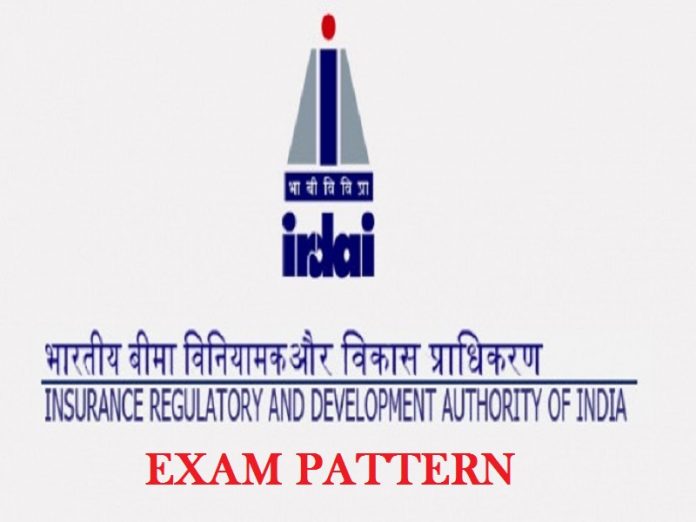IRDAI Assistant Manager Recruitment – Exam Pattern
Dear Friends,
As IRDAI invites applications from eligible Indian citizens for filling up the post of Assistant Manager through open competition on all India basis for its various offices.We are here with the exam pattern for the same to clarify all your doubts.
Phase – I On-line Preliminary Examination (Objective Type) will be for 160 marks with four Tests as under:
|
Sr. No.
|
Name of Tests (Objective)
|
No of Questions
|
Maximum Marks
|
Total Time
|
|
1
|
Test of Reasoning
|
40
|
40
|
Composite time of 90 minutes
|
|
2
|
Test of English Language
|
40
|
40
|
|
|
3
|
Test of General Awareness
|
40
|
40
|
|
|
4
|
Test of Quantitative Aptitude
|
40
|
40
|
|
|
Total
|
160
|
160
|
||
Phase – II Descriptive Examination will consist of three papers as under:
|
Name of Paper
|
Type of Paper
|
Marks
|
Time (Minutes)
|
|
Paper-I: English
|
Descriptive (question papers displayed on computer and to be written using pen and paper)
|
100
|
60
|
|
Paper-II: Economic and Social Issues impacting Insurance
|
100
|
60
|
|
|
Paper-III: Insurance and Management
|
100
|
60
|
Syllabus for Phase – II Descriptive Examination
(i) Paper I – English
a) Essay;
b) Precis writing;
c) Comprehension and Business/Office Correspondence.
(ii) Paper II – Economic and Social Issues impacting Insurance
a) Economic Growth, business cycles and Insurance penetration, impact of age structure on economy, application of utility theory to Insurance premium setting, macroeconomic factors including catastrophes and pandemics that may impact insurers and insurance markets;
b) Financial markets, Financial Institutions and financial services integration and risks arising from interconnectedness; systemic risk and concentration risk;
c) Economic capital and risk based capital requirements, economic impact of risk transfer arrangements including reinsurance, contribution of Insurance sector to sustainable and responsible development of economy, Insurance Investments in Infrastructure sector
d) Economic reforms in India leading to Insurance sector reforms, Insurance regulation – financial and market conduct regulations, functions of IRDAI, role of an Actuary, de-tariffing in India, motor business and Indian experience, changing Insurance Regulations/Laws and FSLRC.
e) Social structure in India, Insurance in rural and social sectors and obligations of Insurers thereto, Indian Micro-Insurance experience, Social security laws and implementation thereof. RSBY – Health insurance scheme for Below Poverty Line (BPL) families.
(iii) Paper III – Insurance and Management
Part 1 – Insurance
a) History of Indian Insurance, principles of Insurance;
b) Risk and uncertainty, pooling and diversification of risk, Indemnity and Insurable interest;
c) Legal foundations of Insurance, basics in Group/Health Insurance/Pensions; Intermediation: role in mobilising savings, evolution of various types and Bancassurance in India;
d) Functions performed by Insurers: Product design, pricing, distribution, underwriting, claims, Investment and Reinsurance;
e) Insurance lines and products : Property-Liability, Life Insurance and Annuities and Health Insurance; Liability risks and Insurance, valuation and Solvency requirements, Specialist Insurance lines in India – Agricultural and Export Credit Guarantee; Reinsurance, GIC of India, obligator sessions and retention of risk within the Country.
Part 2 – Management
a) Its nature and scope;
b) Management Processes – Planning, Organisation, Staffing, Directing and Controlling; role of a Manager in an Organisation;
c) Leadership: The tasks of a leader; leadership styles; leadership theories; A successful leader versus an effective leader;
d) Human Resource Development- Concept of HRD; Goals of HRD; Career Planning – Training and Development;
e) Performance Appraisal – Potential appraisal and development – feedback and performance counselling – rewards – employee welfare;
f) Motivation, Morale and Incentives: Theories of Motivation; How Managers Motivate; Concept of Morale; Factors determining morale; Role of Incentives in Building up Morale;
g) Communication: Steps in the Communication Process; Communication Channels; Oral versus Written Communication; Verbal versus non-verbal Communication; upward, downward and lateral communication; Barriers to Communication;
h) Role of Information Technology;
i) Corporate Governance: Factors affecting Corporate Governance; Mechanisms of Corporate Governance.
Phase – III Interview
- Candidates who have been shortlisted in Phase – II Descriptive Examination will subsequently be called for an Interview. At this stage, in respect of 10 posts proposed to be filled up by the candidates with professional qualifications, the availability of suitable candidates with horizontal (inter-locking) reservation for each such earmarked specialization will be examined for decision by the Competent Authority. Exact venue, its address, time and date of interview will be notified later on IRDAI’s website and the shortlisted candidates for Interview shall download their call letters from IRDAI website as per schedule to be announced.
- Only such number of candidates will be called for interview who stand sufficiently high in order of merit in the aggregate marks of the Phase – II Descriptive Examination, such merit being decided by IRDAI in relation to the number of vacancies to be filled in, under each specialization and General. If there are no candidates under any of the specializations or if no candidates get eligibility under any of the specializations, such vacancies will be considered as General vacancies.



















